居眠り国会とは?
この風刺画について
この風刺画「居眠り国会」は、国会や議会といった公共の意思決定の場で起きている無関心や形骸化を、視覚的に風刺した作品です。
私はこの作品を通じて、政治家が本来果たすべき「国民の代表」という役割がいかに空洞化しているかを表現しました。
画面には、居並ぶ議員たちが一様に目を閉じ、居眠りをしている様子が描かれています。
一見すると滑稽でコミカルなシーンに見えますが、そこには「税金で支えられている政治の場が、本当に機能しているのか?」という鋭い疑問が込められています。
現実の国会中継でも、真剣に議論する場面と並んで、眠っている議員の姿がたびたび話題になります。
この風刺画は、それらの状況を象徴的かつ誇張的に描くことで、見る人の感覚に訴えかけることを目指しました。
また、画面は3つの場面に分かれていますが、どれも本質的には同じ状態を描いています。
つまり、「国が変わっても、会場が変わっても、無関心という病は共通している」というメッセージでもあります。
国民は一票を投じることで「委任」を行いますが、その信頼がどのように扱われているのか。
この作品は、その信頼の行方に対する警鐘として描きました。
このように、「寝ているだけ」の絵の中にも、多層的な意味を込めたのが本作品です。
笑いながら見てほしい一方で、「笑っていられる状況なのか?」という問いを投げかけたいという想いも込められています。
風刺画のポイント
この風刺画を描くにあたり、私が最も意識したのは「皮肉の効かせ方」と「視覚的な面白さのバランス」です。
風刺というのは、単に批判をするだけでは伝わりにくくなってしまいます。
そこで今回は、あえて極端にデフォルメされた表情と構図を用いることで、見る者がクスッと笑ってしまうようなユーモアを取り入れました。
議員たちは皆、スーツを着て整った姿をしているにもかかわらず、その行動は「居眠り」という真逆のものである。
このギャップを強調することで、形式だけが整っていて中身が伴っていないという現代政治の矛盾を浮き彫りにしています。
また、登場人物の多様性も意識しました。
髪型や表情、年齢層、性別、人種などをあえてバラけさせることで、「これは特定の国の問題ではなく、世界共通の政治課題なのだ」と伝えようとしています。
照明や椅子の色合いにも工夫を凝らしました。
どの場面でも茶系や緑系の落ち着いたトーンを採用することで、眠気を誘発するような雰囲気を演出しました。
その中で人物の表情や姿勢だけが非常に豊かに動いているため、視覚的にも目を引く構成となっています。
また、画面上部の「居眠り国会」というタイトルと、その下の英語訳「Dozing Diet member」には、あえてカタカナ英語的な表現を用いました。
これにより、国内外の人々が「日本に限らず、自分たちの国でも同じではないか」と自問できるようにしています。
一方で、あくまで直接的な名指しを避け、風刺としての品位を保つことも意識しました。
最後に、この風刺画は「怒り」ではなく「諦めの笑い」から始まっています。
しかしその笑いの中に、小さな違和感や、変革へのきっかけが芽生えることを願って描きました。
風刺画には、人を非難する以上に、社会全体を映し出す鏡としての役割があります。
この作品もまた、その一枚の鏡になれればと考えています。
AIが描いた「居眠り国会」
AIが描いたイメージ(画像)
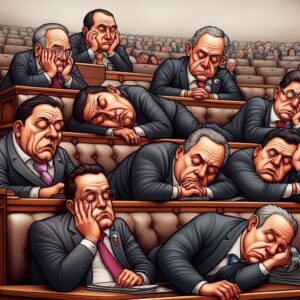 |
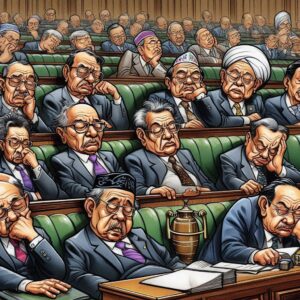 |
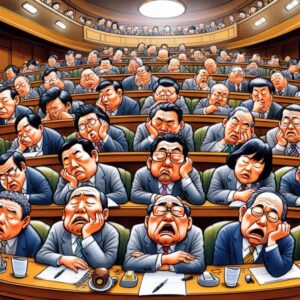 |
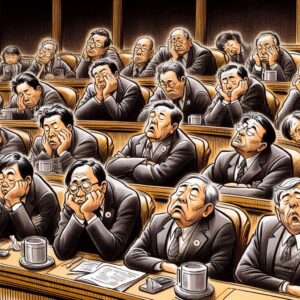 |
 |
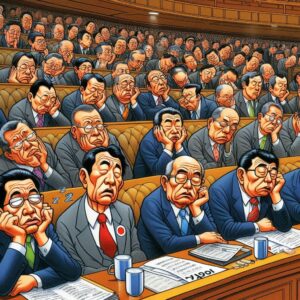 |

コメント